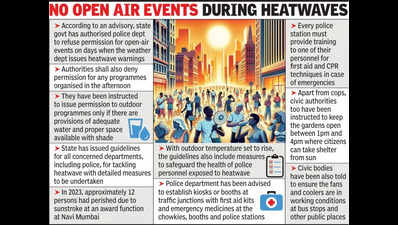Nagpur: Growing influence of climate change, and urban heat islands, particularly in cities like Nagpur, are exacerbating heatwave conditions by raising temperature by 4 to 5 degrees Celsius, said IMD scientist Dr Rizwan Ahmed on Wednesday. He was referencing climatological data from 1961 to 2020, highlighting a significant upward trend in the frequency of heatwaves and hot days across Vidarbha region.
“A difference of 4 to 5 degrees Celsius has been recorded between densely polluted concrete structures and areas having green cover within the same geographical region. Green plantation over the roof or anti-radiation painting of the building can help keep temperature down,” he said. Dr Ahmed said vehicular pollution and cooling appliances are also contributing to the urban heat islands.
Dr Ahmed, posted as scientist D at Aerodrome Meteorological Office, Regional Meteorological Centre (RMC), Nagpur, was speaking on the topic of heatwaves, other severe weather phenomena, and precautionary measures to be taken during weather disasters at a one-day conference organised by the Disaster Management Authority of Maharashtra govt at Washim.
He presented a forecast for March to May 2025, based on initial conditions from January 2025, predicting that maximum temperatures will remain above normal during this period. He further discussed the far-reaching impacts of heatwaves on public health, agriculture, and the energy sector, stressing the need for urgent attention.
Dr Ahmed also highlighted the critical role of district-level heatwave forecasts in ensuring proper dissemination of information. By effectively communicating these forecasts, both the public and the state govt can take timely preparedness steps to reduce the impact of heatwaves on human health and agriculture.
He provided an in-depth analysis of the various factors responsible for triggering heatwaves, particularly focusing on Vidarbha region. He explained how hot and dry air, coupled with low moisture levels, clear skies, and the presence of an anticyclone over the region, contribute significantly to the formation of heatwaves.
Dr Ahmed outlined various mitigation and adaptation strategies aimed at controlling severe heat events in the coming years, particularly over Vidarbha region. His insights provided valuable guidance for future action, emphasising the importance of preparation and proactive measures to address the challenges posed by heatwaves and extreme weather.
The conference was attended by all stakeholders of district-level disaster management, including govt officials, meteorologists, farmers, doctors, students, and experts from various sectors, who gathered to discuss strategies for managing and mitigating the impacts of extreme weather events.


